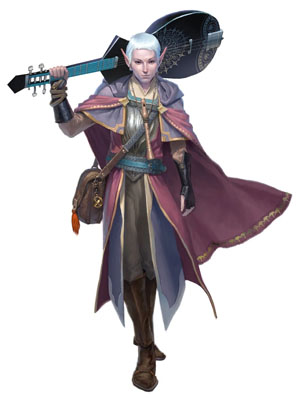 "Humming as she traces her fingers over an ancient
monument in a long-forgotten ruin, a half-elf in rugged
leathers finds knowledge springing into her mind,
conjured forth by the magic of her song—knowledge
of the people who constructed the monument and the
mythic saga it depicts. "Humming as she traces her fingers over an ancient
monument in a long-forgotten ruin, a half-elf in rugged
leathers finds knowledge springing into her mind,
conjured forth by the magic of her song—knowledge
of the people who constructed the monument and the
mythic saga it depicts.
A stern human warrior bangs his sword rhythmically
against his scale mail, setting the tempo for his war chant
and exhorting his companions to bravery and heroism.
The magic of his song fortifies and emboldens them.
Laughing as she tunes her cittern, a gnome weaves
her subtle magic over the assembled nobles, ensuring
that her companions’ words will be well received.
Whether scholar, skald, or scoundrel, a bard weaves
magic through words and music to inspire allies,
demoralize foes, manipulate minds, create
illusions, and even heal wounds." - Player's Handbook
A bard boils down to a deadly artist, but it is when they are assisting others that they become truely deadly. A spellcaster bards are usually fairly weak compared to others in close range, and even at range they can be less deadly than other spell casters. But while their spells might not be wholly geared towards offence, they excell in supporting other players, debillitating enemies, and utility spells. A good example of this is a bard's main damaging cantrip Vicious Mockery deals a measly 1d4 damage, but it gives the effected enemy disadvantage on their next attack. Role-playing wise bards are commonly portrayed as narcisistic, sneaky, or flirtatious, but it is up to the player on how they want to portray their character. Overall this class is good for someone who wants to support others, but still have a large variety of options available to them in battle. |
|